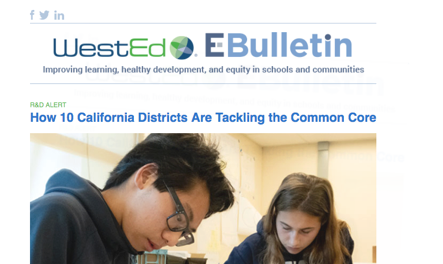Science teachers who are shifting their instruction to meet the vision of the Next Generation Science Standards (NGSS) face a challenge in effectively supporting the ambitious learning embodied in the NGSS performance expectations. The performance expectations — the actual standards that students need to achieve — emphasize that all students should actively use and apply knowledge to make sense of the natural world and solve problems. Importantly, each NGSS performance expectation integrates three dimensions of science proficiency by combining a science or engineering practice, disciplinary core idea, and cross-cutting concept into a single statement of what is to be assessed at the end of a grade level or grade band.
To address this challenge, teachers will need well-designed, NGSS-aligned assessment tasks that they can readily use in their classrooms. Especially needed are (1) tasks and rubrics that can provide just-in-time information about students’ progress, and (2) resources that can support instructional decision-making based on assessment information.
Next Generation Science Assessment Collaborative Description
WestEd recently joined a multi-institutional collaborative that is developing classroom-ready assessment tasks for teachers to gain insights into their students’ progress on achieving the NGSS performance expectations. The group, called the Next Generation Science Assessment (NGSA) collaborative, is a collaboration among experts in science education and assessment from WestEd, University of Illinois at Chicago, Michigan State University, and the Concord Consortium. Their work is supported through funding by the National Science Foundation, the Gordon and Betty Moore Foundation, and the Chan Zuckerberg Initiative.
The NGSA collaborative is developing NGSS-aligned assessment tasks and rubrics for instructionally supportive use in middle school science classrooms. They are also creating accompanying instructional resources for teachers that provide guidance on how to use the tasks to support instruction. The tasks are delivered through an online portal and designed to allow for flexible use by teachers.
For more information about the NGSA design approach and the overarching work of the collaborative, visit our website.
Intended Impact
The collaborative has already created more than 80 NGSS-focused assessment tasks in Physical and Life Sciences. The tasks are freely available through the NGSA online portal. Each task requires students to demonstrate three-dimensional performance, yet a typical task can be completed by students within 5–8 minutes. Moreover, the features of tasks are varied in ways that provide different levels of scaffolding appropriate for students having different levels of ability and for diverse classroom settings. Further, teachers can select the tasks they want to use with their students and can assign them to be completed individually, in small groups, or during whole class instruction.
To learn more about the task portal and try out the assessment tasks, visit our online platform.


